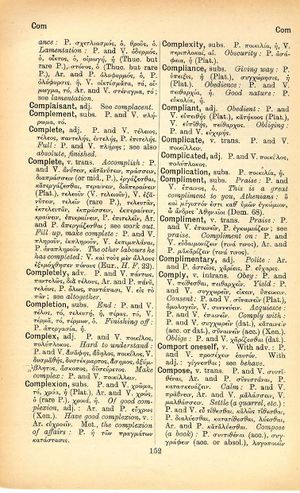compose
Πρόσεχε τῷ ὑποκειμένῳ ἢ τῇ ἐνεργείᾳ ἢ τῷ δόγματι ἢ τῷ σημαινομένῳ. → Look to the essence of a thing, whether it be a point of doctrine, of practice, or of interpretation.
English > Greek (Woodhouse)
verb transitive
P. and V. συντιθέναι, Ar. and P. συνιστάναι, P. κατασκευάζειν.
calm: P. and V. πραΰνειν, Ar. and V. μαλάσσειν, V. μαλθάσσειν.
settle (a quarrel, etc.): P. and V. εὖ τίθεσθαι, καλῶς τίθεσθαι, P. διαλύεσθαι, κατατίθεσθαι, λύεσθαι, Ar. and P. καταλύεσθαι.
compose (a book): P. συντιθέναι (acc.), συγγράφειν (acc. or absol.), λογοποιεῖν (absol.).
compose poetry: Ar. and P. ποιεῖν (acc. or absol.).
compose songs: Ar. μελοποιεῖν (absol.).
compose (for burial): P. and V. περιστέλλειν, προτίθεσθαι V. συγκαθαρμόζειν.
be composed (for burial): P. and V. προκεῖσθαι.
compose oneself: P. and V. ἡσυχάζειν, Ar. and V. μαλάσσεσθαι, V. μαλθάσσεσθαι, ἡσύχως ἔχειν.
be composed of: P. συνίστασθαι ἐκ (gen.), συγκεῖσθαι ἐκ (gen.).
words specially composed to meet the occasion: P. λόγοι πρὸς τὸ παρὸν μεμηχανημένοι (Dem. 847).
men with composed features: P. οἱ πεπλασμένοι (Dem. 1122).
composing his features to hide his knowledge of the calamity: P. ἀδήλως τῇ ὄψει πλασάμενος πρὸς τὴν συμφοράν (Thuc. 6, 58).

